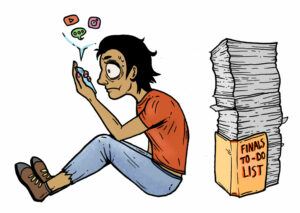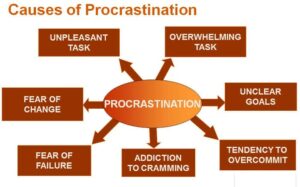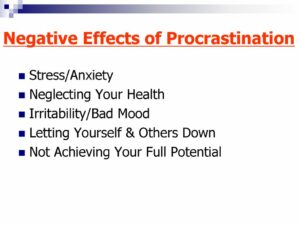Do you find yourself procrastinating on things that you should be doing, like laundry or homework? You’re not alone. In this brief article, we’ll explore the causes of procrastination and how it can be overcome with a few simple steps.
Contents
- 1 What Is Procrastination?
- 2 Signs You Procrastinate
- 3 Different Types of Procrastination
- 4 What Causes Procrastination?
- 5 Negative Effects of Procrastinating
- 6 Overcoming Procrastination
- 7 Tips for Overcoming Procrastination
- 8 Dealing With Perfectionism And Procrast
- 9 Where to Find Help for Your Procrastination Problem?
- 10 Conclusion
What Is Procrastination?
 The act of postponing or delaying something that needs to be done. It’s different than putting off something you don’t want to do, which is laziness. Procrastination occurs when the act of doing the task seems insurmountable. Because it’s harder than other options or you’re overwhelmed by how much work you need to do (e.g., school essay, five overdue assignments).
The act of postponing or delaying something that needs to be done. It’s different than putting off something you don’t want to do, which is laziness. Procrastination occurs when the act of doing the task seems insurmountable. Because it’s harder than other options or you’re overwhelmed by how much work you need to do (e.g., school essay, five overdue assignments).
Procrastination also has negative effects on your mental health and academic performance if you don’t deal with it quickly.
Signs You Procrastinate
Procrastination is a problem that can have a number of negative consequences, such as decreased productivity, lower grades, and anxiety and depression. If you’re not sure if you’re struggling with procrastination, here are some signs that may indicate you’re a procrastinator if you:
- Often put off tasks until the last minute
- Feel overwhelmed or stressed when thinking about a task
- Avoid tasks altogether
- Get easily distracted when working on a task
- Work best under pressure
- Always think you can do better next time
Do not give yourself any deadlines for your tasks; instead, set up specific time slots (e.g., “I will work on my essay from 9-10 pm every day this week”). If you tend to be a perfectionist or strive for excellence, it’s important that you don’t take on too much. This can cause feelings of anxiety and overwhelm, which may increase your need to procrastinate.
Different Types of Procrastination
The different types of procrastination are:
- Project-oriented procrastination: You delay a project because it is too big or overwhelming.
- Time-based procrastination: Time-based is when you may have a deadline, but you put it off.
- Effort-based procrastination: These are tasks that need more work and effort than you originally anticipated.
- Knowledge-based procrastination: This type of procrastination occurs when you don’t know how to do something and avoid the task as a result.
- Avoidance-based procrastination: You put tasks off because you don’t want to do them.
- Socially prescribed procrastination: This refers to a situation where other people expect you to perform a task and you delay it as a result.
What Causes Procrastination?
 The first step is to determine where the act of procrastination stems from. Most people assume it’s laziness, but that isn’t accurate. Laziness implies you don’t want to do something – you’re just unwilling because it’s a harder task than alternative options. But many people find a way to make their procrastinated tasks harder by convincing themselves that the work is insurmountable. This can be due to a lack of confidence, perfectionism, or simply being overwhelmed by the task at hand.
The first step is to determine where the act of procrastination stems from. Most people assume it’s laziness, but that isn’t accurate. Laziness implies you don’t want to do something – you’re just unwilling because it’s a harder task than alternative options. But many people find a way to make their procrastinated tasks harder by convincing themselves that the work is insurmountable. This can be due to a lack of confidence, perfectionism, or simply being overwhelmed by the task at hand.
Once you understand the root cause of your procrastination, it becomes easier to address it. If you’re struggling with confidence, try breaking the task down into smaller steps that you can complete. This will help you feel more in control and capable of completing the entire project. If you’re overwhelmed, try setting a timer for a specific amount of time and work on the task until the timer goes off. This will help you stay focused without feeling overwhelmed.
If you still find yourself struggling to overcome procrastination, there are a few external resources that can help. A therapist or counselor can help you identify the root cause of your procrastination and provide strategies to address it. There are also online courses and programs that offer similar assistance.
Whatever method you choose, overcoming procrastination is possible. It just takes a bit of effort and willingness to change.
Negative Effects of Procrastinating
 Procrastination can have a number of negative effects on your mental health and academic performance. When you put off a task, you may feel overwhelmed and stressed. This can lead to anxiety and depression. Procrastination can also interfere with your sleep, which can lead to further problems such as poor concentration and decreased productivity. In addition, procrastination can cause you to miss deadlines and get lower grades.
Procrastination can have a number of negative effects on your mental health and academic performance. When you put off a task, you may feel overwhelmed and stressed. This can lead to anxiety and depression. Procrastination can also interfere with your sleep, which can lead to further problems such as poor concentration and decreased productivity. In addition, procrastination can cause you to miss deadlines and get lower grades.
Overcoming Procrastination
 If you’re finding it difficult to get started on a task, or if you keep pushing tasks off until the last minute, you may be struggling with procrastination. Procrastination is the act of postponing or delaying something that needs to be done. It’s different than putting off something you don’t want to do, which is laziness. Procrastination occurs when the act of doing the task seems insurmountable because it’s harder than other options or you’re overwhelmed by how much needs to be done (e.g., school essay, five overdue assignments).
If you’re finding it difficult to get started on a task, or if you keep pushing tasks off until the last minute, you may be struggling with procrastination. Procrastination is the act of postponing or delaying something that needs to be done. It’s different than putting off something you don’t want to do, which is laziness. Procrastination occurs when the act of doing the task seems insurmountable because it’s harder than other options or you’re overwhelmed by how much needs to be done (e.g., school essay, five overdue assignments).
Here are three steps for overcoming procrastination:
1. Identify The Root Cause
There are many reasons why you may be prone to procrastinating, including a lack of confidence in your abilities, being overwhelmed by the task at hand, or perfectionism. Once you determine why you’re struggling with procrastination it will be easier to overcome it.
2. Break The Task Down Into Smaller Steps
When a task feels overwhelming, it’s easy to put it off. But if you break the task down into smaller more manageable steps, it becomes easier to start and complete.
3. Seek Help If Needed
If you’ve tried these tips and still find yourself struggling with procrastination, you may benefit from a counselor or online course.
Procrastination is delaying an action that needs to be completed, and it can have negative effects on your mental health and academic performance if you don’t deal with it quickly.
Tips for Overcoming Procrastination
 If you’re struggling with the act of procrastinating, there are some things that can help reduce or reduce your tendency for this behavior. Tim Pychyl, a psychology professor at Carleton University in Canada, offers several suggestions on how to overcome procrastination:
If you’re struggling with the act of procrastinating, there are some things that can help reduce or reduce your tendency for this behavior. Tim Pychyl, a psychology professor at Carleton University in Canada, offers several suggestions on how to overcome procrastination:
1. Make a plan: When you have a specific plan for how to complete a task, it’s less daunting and easier to get started.
2. Set small goals: Break down a larger goal into smaller, more manageable tasks to make them easier to accomplish.
3. Eliminate distractions: Turn off your phone, computer, and television so you can focus on the task at hand.
4. Set a time limit: If you have a certain amount of time to complete a task, you’ll be more motivated to get started.
5. Reward yourself: Give yourself a break once you’ve completed a task, even if it’s just for five minutes.
6. Be accountable: Tell someone else about your goals and plans so you’re more likely to stick to them.
7. Take a break: If you feel overwhelmed or stuck, take a break to clear your head and come back fresh.
8. Change your attitude: Believe that you can do it and that it’s not impossible.
9. Stay positive: Don’t feel bad if you don’t see results immediately. Changing your behavior takes time and effort.
10. Persevere: Don’t give up; overcoming procrastination is possible with a bit of effort and determination.
Dealing With Perfectionism And Procrast
Dealing with perfectionism and procrastination can be challenging. A common method for dealing with something is to tackle the most difficult parts at first. That way, you build up enough momentum so that you can get past the more challenging parts easier.
Acknowledge your feelings, don’t ignore them. It’s easy to feel okay about an impulsive decision made out of frustration if you consider the emotion that gave rise to that decision in the first place. Acknowledge your feeling then try to find an appropriate way to deal with them before they become counterproductive.
Create a timeline for your task. Having a timeline for a project can help reduce the pressure you feel to complete it perfectly. This also allows you to better estimate how long a project will take, which can help reduce stress.
Set realistic goals. Don’t try to do too much at once; set realistic goals that you know you can accomplish. If you’re struggling, break down the goal into smaller tasks that are more manageable.
Understand your triggers. If there are certain things that trigger your procrastination tendencies, such as stress or boredom, try to find ways to avoid them or manage them better.
Talk to someone about your problem. Sometimes it helps to talk to someone about your struggles with perfectionism and procrastination. Talking to them can help you get feelings out in the open so you’re not bottling them up, which may cause your problem to escalate.
Know when to take a break. Sometimes perfectionism and procrastination go hand-in-hand because fear of failure causes people to avoid tasks they need to complete. If you feel overwhelmed or stressed about a task, try taking a break before diving back in. This can re-energize you and make it easier for you to deal with the task at hand again when you come back to it fresh.
Where to Find Help for Your Procrastination Problem?

If you’re struggling with procrastination, there are a number of resources available to help you. A therapist or counselor can help you identify the root cause of your problem and provide strategies to address it. There are also online courses and programs that offer similar assistance.
Whatever method you choose, overcoming procrastination is possible. It just takes a bit of effort and willingness to change. So stop putting off the things you need to do and complete the task.
Therapy– Therapy is a good option if you want to identify the root cause of your procrastination. It can help you stop procrastinating and
Online Courses/Programs– There are many online courses and programs that can help you overcome procrastination.
Self Help– If you want to try to overcome your procrastination on your own, there are a number of resources available, such as books and websites.
Resources
Procrastination occurs when the act of doing the task seems insurmountable because it’s harder than other options or you’re overwhelmed by how much needs to be done (e.g., school essay, five overdue assignments).
When deciding whether to procrastinate, people take into account their motivation and available resources. If these two things are low, then a person is more likely to procrastinate. Procrastination also has negative effects on your mental health and academic performance if you don’t deal with it quickly.
If you’ve tried these tips and still find yourself struggling with procrastination, there are a number of resources available to help you. A therapist or counselor can help you identify the root cause of your problem. There are also online courses and programs that offer similar assistance.
Conclusion
The article has provided you with some great tips for dealing with procrastination. The most important thing to remember is that nothing happens overnight and it takes time, effort, determination, and patience to overcome this behavior. If you are struggling or feel like giving up on your goals because of perfectionism or lack of motivation then the information in this blog post may be able to help you get back on track.
If you are looking for affordable Online Counseling MantraCare can help: Book a trial therapy session


